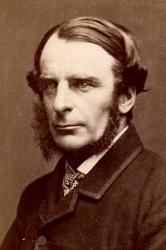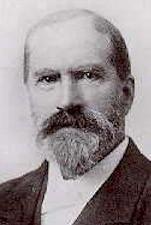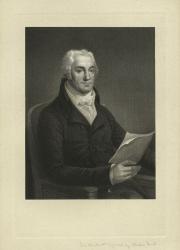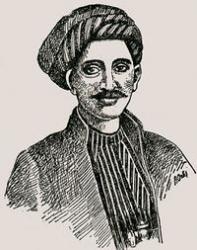Planning worship?
Check out our sister site, ZeteoSearch.org,
for 20+ additional resources related to your search.
- |
User Links
Person Results
Charles Kingsley

1819 - 1875 Author of "From Thee All Skill and Science Flow" in The Cyber Hymnal Kingsley, Charles, M.A., son of Charles Kingsley, of Battramsley, in the New Forest, was born June 12. 1819. at Home Vicarage, Devon. In 1838 he entered Magdalene Coll. Cambridge, and graduated as first class in classics, and senior optime. Subsequently Rector of Eversley 1814-1875; Canon of Chester 1869-1873; and Canon of Westminster 1873-1875. He held also other important appointments. He died at Eversley, Jan. 23, 1875. Canon Kingsley's prose works are too well known to be enumerated here, and his poetical productions have little in common with hymnology. Three of his pieces have come into use as hymns:—
1. Accept this building, gracious Lord. [Hospitals.] "Mrs. Kingsley's account of this hymn is:—
"On the 4th of December [1871], Lord Leigh laid the foundation stone of the working men's block of the Queen's Hospital at Birmingham with masonic honours, and the following simple hymn, which Mr. Kingsley had been requested to compose for the occasion, was sung by a choir of 1,000 voices:—
'Accept this building, gracious Lord,
No temple though it be;
We raise it for our suffering kin,
And so, good Lord, to Thee.'"
The hymn in full follows in 6 stanzas of 4 lines. (Charles Kingsley: His Letters and Memoirs of his Life. 1876, vol. ii., p. 370.) From this the hymn, well-known in American collections and in a few in Great Britain, “From Thee all skill and science flow," is taken. It is composed of stanzas iii.-vi.
2. My fairest child, I have no song to give you. [Purity and Courage.] Appeared in his Andromeda and Other Poems, 1858, p. 64, in 2 stanzas of 4 lines and entitled "Farewell." In the Life and Works of Kingsley, Poems, vol. 16, 1902, it is given in 3 stanzas of 4 lines, and inscribed to "C. E. G." and the appended date is "February 1, 1856." The addition of the extra stanza, as given in Mrs. Kingsley's Charles Kingsley: His Letters, &c,
1876, vol. ii., p. 236, is thus explained: "The Farewell' to his niece Mrs. Theodore Waldron, then Charlotte Grenfell, was written this year [1856], and as the second verse, by some mistake, was not published, it is given entire here." At the end of the poem the place and date are given as "Ray” Lodge, 1856." The lines so frequently included in hymnals for Girls' High Schools, "Be good, sweet maid, and let who will be clever," are from this poem.
3. Who will say the world is dying [The Coming Kingdom.] In his Andromeda and Other Poems, 1858, p. 123, in 3 stanzas of 8 lines and entitled "The World's Age." is dated 1849. In Horder's Worship Song, 1905.
--John Julian, Dictionary of Hymnology, New Supplement (1907)
Charles Kingsley
L. H. Sigourney

1791 - 1865 Person Name: Lydia H. Sigourney Author of "Lord, May The Spirit Of This Feast" in The Cyber Hymnal Sigourney, Lydia, née Huntley. This distinguished name stood at the head of the female poets of America a generation ago, and is still well remembered. Born in Norwich, Connecticut, in 1791, she conducted a school in the same town from 1809 to 1814, when she removed to Hartford, where she was married to Charles Sigourney in 1819. Most of her subsequent life was spent at Hartford, and she died there, June 10, 1865. Her first publication was Moral Pieces in Prose and Verse, 1815. This was followed by 58 additional works. A thorough exploration of these, or of such of them are poetical, would be necessary to trace her hymns with accuracy. They, however, are more numerous than important. Many have been used in the older collections; some are still in use, but few are extensively and none are universally so. The principal hymnbooks in which they appeared were the Congregational Village Hymns, 1824; Kipley's Selection, 1829; and the Connecticut Psalms & Hymns, 1845; the Baptist Additional Hymns by Winchell, 1832; and Linsley and Davis's Select Hymns, 1836; and the Universalist's Hymns for Christian Devotion, by Adams & Chapin, 1846.
Her best known hymns chronologically arranged are:—
1. When adverse winds and waves arise. In Affliction. A graceful lyric, possibly inspired by Sir R. Grant's " When gathering clouds around I view."
2. Blest Comforter divine. Whitsuntide. This is one of four hymns by Mrs. Sigourney, which appeared in Nettleton's Village Hymns, 1824, under the signature of "H." It is sometimes altered to "Thou Comforter divine." Her best hymn.
3. We mourn for those who toil. Death and Burial. This poem on "Mistaken Grief" appeared in Cheever's Common Place Book, 1831
4. Choose ye His Cross to bear. Holy Baptism. This was given in Ripley's Selection, 1829-31.
5. Saviour, Thy law we love. Holy Baptism. In Winchell's Additional Hymns, 1832.
6. Onward, onward, men of heaven. Missions. This missionary hymn appeared in three different books in 1833, including the Christian Lyre Supplement, &c.
7. Labourers of Christ, arise. Home Missions. This was contributed, with nine others, by Mrs. Sigourney, to Linsley & Davis's Select Hymns, 1836. This is one of the most widely used of her hymns.
8. Pastor, thou art from us taken. Burial of a Minister. Sung at the funeral of the Rev. G. F. Davis, D.D., circa 1836.
9. Go to thy rest, my [fair] child. Death of a Child. From a Selection from her poems published in London in 1841.
10. Not for the summer hour alone. Holy Matrimony. In the same Selection as No. 9.
11. Where wilt thou put thy trust? Leaning upon God. In the Connecticut Cong. Psalms & Hymns, 1845.
12. Lord, may the spirit of this feast. Holy Communion. In the same as No. 11.
13. We praise Thee if one rescued soul. Temperance Anniversary. In Adams and Chapin's Hymns for Christian Devotion, 1846.
In addition to these hymns there are several others in the collections named above. As, however, they are not repeated in modern hymnbooks they are omitted from this list. We would add that two hymns, not noted above, "Little raindrops feed the rill" (Power of little things), and "There was a noble ark," are in common use in Great Britain; and that a selection of her pieces is given in the Lyra Sacra Americana, London, 1868. [Rev. F. M. Bird, M.A.]
-- Excerpts from John Julian, Dictionary of Hymnology (1907)
==================
Sigourney, Lydia, p. 1057, ii. Additional hymns are:
1. We thank Thee, Father, for the day. Sunday. This in Stryker's Church Songs, 1889, is dated 1850.
2. When the parting bosom bleeds. For Use at Sea. From Adams and Chapin's Hymns for Christian Devotion, 1846.
3. Prayer is the dew of faith. Prayer.
4. We praise Thee, Lord, if but one soul. An altered form of her hymn on Temperance (No. 13).
--John Julian, Dictionary of Hymnology, Appendix, Part II (1907)
L. H. Sigourney
Joseph Bromehead
1747 - 1826 Person Name: Joseph Bromehead (?) Author of "Jerusalem, My Happy Home" in The Church Hymnal Bromehead, Joseph, M.A., was born in 1748 and educated at Queen's College, Oxford; B.A. 1768, M.A. 1771. Subsequently he was Curate of Eckington, Derbyshire, to his death, January 30, 1826. He was the author of The Melancholy Student, 2nd edition 1776, of some Psalm versions, and the popular form of “Jerusalem, my happy home," q.v.
--John Julian, Dictionary of Hymnology, New Supplement (1907)
Joseph Bromehead
Laurence Hull Stookey
1937 - 2016 Author (st. 3) of "In Christ There Is No East or West" in The New Century Hymnal res.: Rockville, Md.; prof., Wesley Theological Seminary, Wash. D.C.
Rev. Stookey died October 16, 2016. --UM News
Laurence Hull Stookey
H. D. Rawnsley

1851 - 1920 Person Name: Hardwicke D. Rawnsley Author of "Father, Whose Will Is Life and Good" in The Hymnbook Rawnsley, Hardwicke Drummond, M.A., son of the Rev. R. D. B. Rawnsley, M.A., sometime Prebendary of Lincoln, was born at Shiplake-on-Thames, Sept. 28,1850, and educated at Ball. Coll., Oxford, B.A. 1875, M.A. 1883; D. 1875, P. 1877; Curate of St. Barnabas, Bristol, 1875-77; Vicar of Low Wray, Lancashire, 1878-83, and Vicar of Crosthwaite since 1883. He became Rural Dean of Keswick 1883, Hon. Canon of Carlisle 1893, and Proctor in Convocation 1905. His publications include: Notes for the Nile, 1892; Literary Associations of the English Lakes, 1894; Memoir of Harvey Goodwin, Bishop of Carlisle, 1896; Sermons on the Logia, 1897, and various books of Poems and Sonnets. The best-known of his hymns are:—
1. Hark! I hear the trumpet sounding. [Mission Hymn for Children.] In the Ch. Missionary Hymn Book, 1899.
2. Lord God, our praise we give. [In Praise of Nature]. Contributed to the 1904 ed. of Hymns Ancient & Modern.
3. Now trumpets cease your sound. [Peace.] In Hymns of the Kingdom . . . for the use of the Christian Democracy. Norwich, 1903.
4. Saviour, Who didst healing give. [St. Luke.] Written at Crosthwaite Vicarage, Dec. 1, 1905, and included in The English Hymnal 1906.
5. Lord Jesu, Who at Lazarus' tomb. [Memorial of the Dead.] Written at Crosthwaite Vicarage, Dec. 2, 1905, for The English Hymnal, 1906.
6. Lord, Who gavest streams and fountains. [For a Dual School.] Written in 1898 at Keswick for the Holiday Association of the Home Readers' Union, and included in the Keswick School Hymn Book.
--John Julian, Dictionary of Hymnology, New Supplement (1907)
H. D. Rawnsley
Hugh Stowell

1799 - 1865 Author of "Jesus, our Savior and our Lord" in Hymns of Worship and Remembrance Stowell, Hugh, an able and popular minister of the Church of England, was born at Douglas, Isle of Man, December 3, 1799. He graduated at Oxford in 1822, and took holy orders the following year. He held various offices in his Church; became rector at Salford in 1831; was appointed honorary Canon of Chester Cathedral in 1845, and later Rural Dean of Eccles. He published several volumes. He also edited a book of hymns: A Selection of Psalms and Hymns Suited to the Services of the Church of England, 1831. To the several editions of this book most of his hymns were contributed. He died at Safford October 8, 1865.
From every stormy wind that blows 495
Lord of all power and might 206
Hymn Writers of the Church, 1915 by Charles Nutter
==================================
Stowell, Hugh, M.A., son of Hugh Stowell, Rector of Ballaugh, near Ramsey, was born at Douglas, Isle of Man, Dec. 3, 1799, and educated at St. Edmund Hull, Oxford, B.A. 1822; M.A. 1826. He was ordained in 1823, and held the curacy of Shepscombe, Gloucestershire; and then that of Holy Trinity, Huddersfield. Subsequently he was Curate in charge of St. Stephen's, Salford, and became rector of Christ Church, Salford, in 1831. In 1845 he was appointed Hon. Canon in Chester Cathedral; in 1851 Chaplain to the Bishop of Manchester; and Rural Dean of Eccles. He died at Salford, Oct. 8, 1865. His Memoir, by the Rev. J. B. Marsden, was published in 1868. Canon Stoweli was a popular and effective preacher. His publications included Tractarianism Tested, 1845; A Model for Men of Business, 1854 ; Pleasures of Religion and Other Poems, 1832; The Peaceful Valley, 1826 ; and a large number of single sermons, pamphlets, &c. His Selection of Psalms & Hymns was published as:—
A Selection of Psalms & Hymns Suited to the Services of the Church of England. By the Rev. H. Stowell, M.A., Manchester. Printed by Henry Smith, St. Ann's Square, 1831.
This Selection contained 233 hymns, in addition to versions of the Psalms. Of the hymns the following were by the compiler:—
1. Almighty Shepherd, Who didst give. (1828.) The Good Shepherd.
2. From every stormy wind that blows.
3. Gracious God, look down in kindness. Sunday School Anniversary.
4. Great God, we dare not bow the knee. Holy Communion.
5. Meek Lamb of God, on Thee. Lent.
6. To Thee, 0 God, we raise. Sunday School Anniversary.
7. Tune every heart, wake every tongue. Sunday School Anniversary.
8. When Jesus left the glorious sky. For an Infants’ School.
9. Yes, in the morning of our years. Sunday School Anniversary.
The 12th edition of this Selection published by Canon Stowell in 1864, was increased to 273 hymns, the additional hymns being in nearly every instance his own compositions. In addition to those already given we have:—
10. Again our yearly strain we raise. 1864.
11. Another year has glided past. (Before 1846.)
12. Another year with mercies strown. (Before 1846.)
13. Before Thy throne, 0 Lord, we bend. (Before 1846.)
14. By pressing dangers compassed round. 1843 (?).
15. Come, raise we all the blessed strain. 1862.
16. Hail, hallowed day of heavenly rest. 1844 (?).
17. Hark, how sweet those infant voices. 1841 (?).
18. How fruitless is the ploughman's toil. 1854.
19. How gently in night's silent hours. 1850.
20. Jesus is our Shepherd, Wiping, &c. 1849.
21. Jesus, Lord, Who hast ascended. 1853.
22. Jesus, Lord, we wait on Thee. 1863.
23. Jesus, our Saviour and our Lord. (Before 1846.)
24. Jesus, Prophet of Thy Church. 1861.
25. Lord, if our land be great and free. 1851.
26. Lord, in this dark and stormy day. 1848.
27. Lord, in Thy mercy hear our cry. 1855.
28. Meek Lamb of God, Who dost impart. 1859.
29. 0 God, the liquid sign of grace. 1856.
30. Sailing o'er life's changeful ocean. (Before 1846.)
31. Saviour, guide this little band. (Before 1846.)
32. The day of rest is passed away. (Before 1846.)
33. The morn of our lifetime is fast gliding by. (Before 1846.)
34. Though our lot be poor and lowly. 1847.
35. Thy cross, 0 Lord, the holy sign. 1840.
36. Wake, wake our yearly strain anew. 1852.
37. Wake, wake the joyful song. 1844.
38. We, a little simple throng. (Before 1846.)
39. We, little pilgrims of a day. 1845.
40. We love the holy house of prayer. 1857.
41. We will not weep as others do. 1842.
42. What is your life? It glances by. 1860.
43. What though our earthly lot be low. 1858.
These hymns were all written for the Anniversary Services of Christ Church Sunday Schools, Salford, and are included with others in a special Appendix in the 1877 ed. of the Selection as above.
Other hymns by Canon Stowell are:—
44. Children of old, Hosannah sang. Sunday Schools. 1830.
45. Lord of all power and might, Father of love, &c. Missions. Written for the Jubilee of the B. & F. Bible Society, March 7, 1853.
46. Shepherd of the ransomed sheep. The Good Shepherd.
47. Pilgrims in the narrow way. Sunday School Anniversary. This was his last hymn, and was written for the Christ Church Sunday School Anniversary, 1865.
Of Canon Stowell's hymns the most popular are Nos. 2, 3, 20 and 44. As a writer for children he was very successful. All the foregoing hymns are in the 15th ed. of his Selection edited by his son, Manchester, 1877; and in Hymns. By the late Rev. Canon Stowell, M.A. Manchester, 1868.
-- John Julian, Dictionary of Hymnology (1907)
Hugh Stowell
Arthur Cottman
1842 - 1879 Person Name: Arthur Cottman, 1842-1879 Composer of "ST. PETER" in The Hymnary of the United Church of Canada Born: Circa November 1841, Ringwood, Hampshire, England.
Died: Circa May 1879, Brentford, Middlesex, England.
Cottman was a solicitor and amateur musician. His works include:
Ten Original Tunes, 1874
Music:
CATERHAM
COTTMAN
DALEHURST
EVERSLEY
MIRFIELD
MORN OF GLADNESS
--www.hymntime.com/tch
Arthur Cottman
Greville Phillimore
1821 - 1884 Author of "O God, Before Thy Sun's Bright Beams" in The Cyber Hymnal Phillimore, Greville, M.A., was born in 1821 and educated at Westminster, the Charterhouse, and Christ Church, Oxford (B.A. 1842). Taking Holy Orders in 1843, he became Vicar of Downe-Ampney, Cricklade, Gloucestershire, in 1851, Rector of Henley-on-Thames, 1867, and of Ewelme, 1883. He died Jan. 20, 1884. His Parochial Sermons were pu.lished in 1856. He was joint editor with H. W. Beadon and J. R. Woodford (afterwards Bishop of Ely) of The Parish Hymn Book, 1863 (195 hymns), and the enlarged edition, 1875 (274 hymns). The first edition of this collection was one of the first hymn-books which gave Dr. Neale's translations of Greek hymns for congregational use. To the 1863 edition Mr. Phillimore contributed the following hymns, several of which have been repeated in other collections:—
1. Christ, through grief and toil we come. Epiphany.
2. Darkly frowns the eastern sky. Good Friday Evening and Easter Eve.
3. Every morning they are new.
4. Lonely in her virgin home. Annunciation of the Blessed Virgin Mary.
5. 0 fear not, little flock. Security of the Church in Christ.
6. 0 God, before the sun's bright beams. Morning.
7. 0 God, the weary path of life. Public Worship.
8. 0 Lord of health and life, what tongue can tell. Epiphany.
9. Peace be in the house of death. Evening, or Anticipation of Death.
10. Saul, why such furious hate, such blinded zeal? Conversion of St. Paul.
11. Thou art gone up on high, Why gaze they, &c. Ascension.
In addition some of Mr. Phillimore's translations from the Latin were given in the 1863 edition of the Parish Hymn Book; and other original hymns which are annotated under their respective first lines. His hymn forSaints Days, "O Lord of glory, King of saints," was included in the 1875 edition of that collection. Phillimore's Sermons and Hymns. were published in 1884.
-- John Julian, Dictionary of Hymnology (1907)
Greville Phillimore
Joel Barlow

1754 - 1812 Person Name: Joel Barlow, 1755-1812 Author of "Awake, My Soul! To Sound His Praise" in The Cyber Hymnal Barlow, Joel, born at Reading, Connecticut, 1755 [sic], graduated at Yale 1778, and died near Cracow, Poland, 1812, He was well known as an author and politician during and after the American Revolution. His publications include Hasty Pudding; Columbia, &c. In 1785, at the request of the (Congregational) General Association of Connecticut, he corrected and enlarged Dr. Watts's Psalms, supplying those omitted by Watts, and adapting the whole to American thought and circumstances. This work, published in 1786, went through various editions, and, although officially superseded by Dwight in 1800, it continued to be issued for many years after. Its title is somewhat curious as setting forth its design. It reads:— Psalms carefully suited to the Christian Worship in the United States of America, being Dr. Watts’ Imitation of the Psalms of David, as improved by Mr. Barlow. Of his renderings of the Psalms, there are still in common use:—
1. Awake, my soul, to sound His praise. Ps. cviii. This is No. 233 in Hatfield's Church Hymn Book, 1872, and other collections.
2. Lord,Thou hast scourged our guilty land. Ps. lx. Altered from Watts. Also in Hatfield's Church Hymn Book, No. 1312.
3. Our land, O Lord, with songs of praise. Ps. xxxi . In the Philadelphia Presbyterian Hymnal, 1874.
4. In Thee, great God, with songs of praise. National Hymn. This is No. 3 in a slightly different form. It is No. 962 in N. Adams's Church Pastorals, Boston, 1804. [Rev. F. M. Bird, M.A.]
-- John Julian, Dictionary of Hymnology (1907)
Joel Barlow
Nāşīf Yāzijī

1800 - 1871 Person Name: ناصيف اليازجي Author of "إسم يسوع قد حلا" in كتاب الترانيم الروحية للكنائس الإنجيلية Nasif al-Yaziji (March 25, 1800 – February 8, 1871) was a Lebanese author at the times of the Ottoman Empire and father of Ibrahim al-Yaziji. He was one of the leading figures in the Nahda movement. We was a poet, wrote and translated many hymns, and helped in translating the complete Bible into Arabic.
ناصيف بن عبد الله بن جنبلاط بن سعد اليازجي (25 مارس 1800 - 8 فبراير 1871)، أديب وشاعر لبناني ولد في قرية كفر شيما، من قرى الساحل اللبناني في 25 آذار سنة 1800 م في أسرة اليازجي التي نبغ كثير من أفرادها في الفكر والأدب، وأصله من حمص.
لعب دورا كبيرا في إعادة استخدام اللغة الفصحى بين العرب في القرن التاسع عشر، عمل لدى الأسرة الشهابية كاتبا وشارك في أول ترجمة الإنجيل والعهد القديم إلى العربية في العصر الحديث.
Nāşīf Yāzijī


 My Starred Hymns
My Starred Hymns


